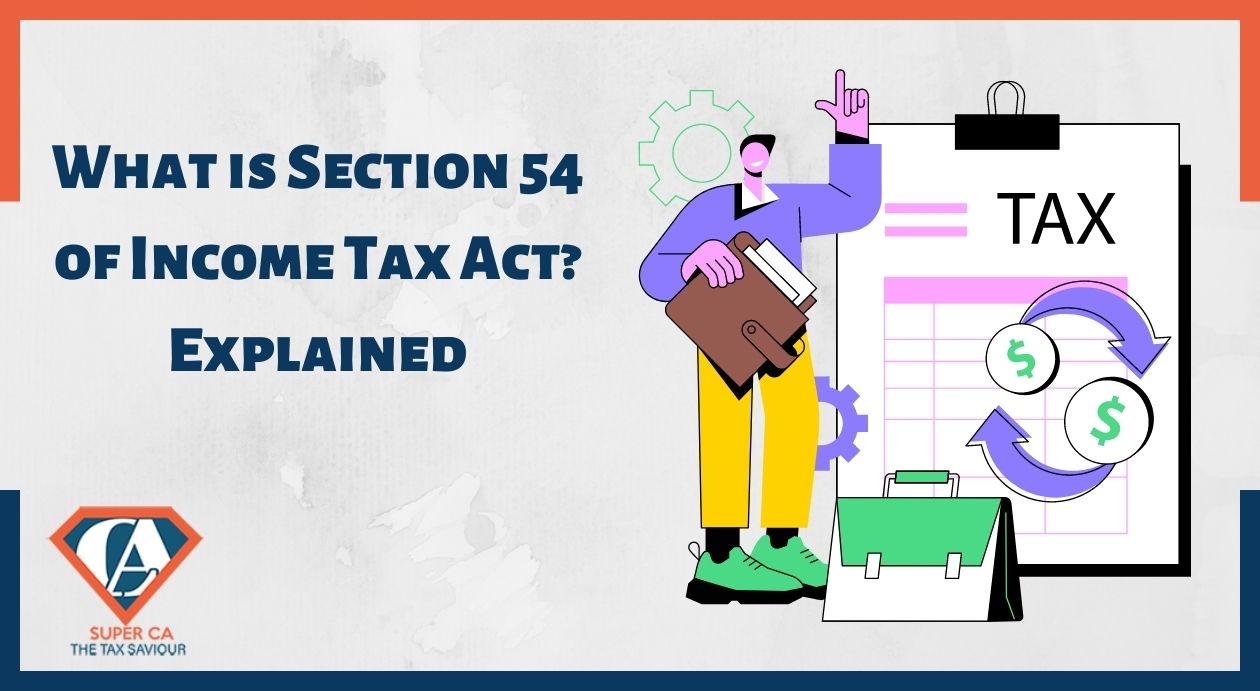What is Section 54 of Income Tax Act? Explained


Today most of the assets come under the purview of Income Tax. One of the sole principles of Indian taxation law says that any profit earned by an individual by property sales is usually taxable. But, Section 54 of the Income Tax Act allows one to avail tax exemptions on selling a residential property by investing the profit for purchasing a new one. It applies to HUFs (Hindu Unified Families) and other eligible individuals only. However, no organizations/companies, partnership firms, or LLPs are eligible for this exemption.
Section 54 mainly applies when taxpayers utilize the capital gains of selling one residential property for purchasing or constructing a new one.
Let us say a person wants to shift his residence due to certain reasons and hence he sold his old house. From the sale proceeds, he decides to purchase a new house in another location.
It is clear in this case that the objective of the seller is not to earn income by the sale of the old house but to acquire another suitable house. If in this case, the seller was liable to pay income tax on capital gains arising from the sale of the old house, then it would impose a hardship on him and definitely disrupt his financial planning.
That's where Section 54 of the Income Tax Act comes in which offers a seller of a residential house or property some relief from the capital gains tax by allowing him/her to avail tax exemption on the capital gain arising from the transfer of a residential house property. The exemption under section 54 is available in respect of the rollover of capital gains arising on the transfer of a residential house into another residential house. However, to ensure that no misuse of this benefit is done and it is available only to long-term buyers only, restrictions have been put up.
If taxpayer purchases or constructs a house and claims exemption under section 54 and then transfer the new house within a period of three years from the date of its acquisition or completion of construction, or the property is sold after holding it for a period of fewer than 24 months, it will be seen as a short-term capital asset and the benefit granted under section 54 will be withdrawn.
According to the provisions prescribed u/s 54 of the Income Tax Act, any individual/taxpayer selling their residential property and using the capital gain to purchase new property is eligible for a tax exemption. Having said that, for availing of tax exemption, a taxpayer must qualify for the following eligibility criteria-
➤ The applicants include only individuals ondHUF, and no organizations/companies, partnership firms, or LLPs will be eligible for this exemption.
➤ Moreover, the property should be a residential one.
➤ A house property in the sale should be considered a long-term capital asset. For Section 54, the house property should be held for more than a period of 24 months to consider an asset as a long-term capital asset.
➤ One should buy a new residential property either a year before the transfer or two years after the sale.
➤With effect from Assessment Year 2021-22, the Finance Act, 2020 has amended Section 54 to extend the benefit of exemption in respect of investment made in two residential house properties. However, the exemption is subject to the capital gain not exceeding Rs 2 Cr. This option can be exercised by the taxpayer only once in his lifetime.
➤ The house property should be sold and bought in India. A taxpayer cannot sell a home in India and buy a home abroad and claim the exemption.
All the above criteria must be fulfilled. Non-fulfillment of any of the conditions makes the person ineligible to avail of exemption.
Exemption under section 54 can be claimed in respect of capital gains arising on transfer of a capital asset, being long-term residential house property. Exemption under section 54 will be lower of the following-
➤ Amount of capital gains arising on transfer of residential house
➤ Amount invested in purchase/construction of new residential house property
For Instance, Mr. X purchased a residential house in April 2016 and sold the same in April 2022 for Rs. 8,40,000. Capital gain arising on sale of house amounted to Rs. 1,00,000. Out of the sale proceeds of the old house, he purchased another residential house for Rs. 60,000 in May 2022. In this case, the exemption amount will be Rs. 60,000 and taxable capital gain will come to Rs. 40,000 (Rs. 1,00,000 minus exemption under section 54 of Rs. 60,000).
If you may say, the amount of investment in a new house was Rs. 1,20,000. In this case, the exemption will be Rs. 1,00,000 which means the entire capital gain will be exempted.
The exemption that can be availed under Section 54 is only available for a long-term Capital Gain that is received after selling a house or residential property, whereas the exemption under Section 54F is available on a long-term Capital Gain on the sales of an asset that falls in a category apart from a residential property. Both sections are quite similar as exemption available on the purchase of a residential house but in the case of section 54F, you cannot own more than one property at the time of transfer. Further, the exemption is available only if the entire net sale proceeds are invested.
Section 54 of the Income Tax Act allows tax exemptions and relief on long-term capital gains that are received from the sale of a residential property with a motive to buy or construct another one. One can claim this benefit by either purchasing/ constructing a new residential property or by depositing the number of sale proceeds in the Capital Gains Account Scheme in any authorized bank.

|
Essential LLP Registration Documents: A Complete Checklist for Entrepreneurs Author: Rahul Singh 04 Apr, 2024
|
Get inspired by these stories.